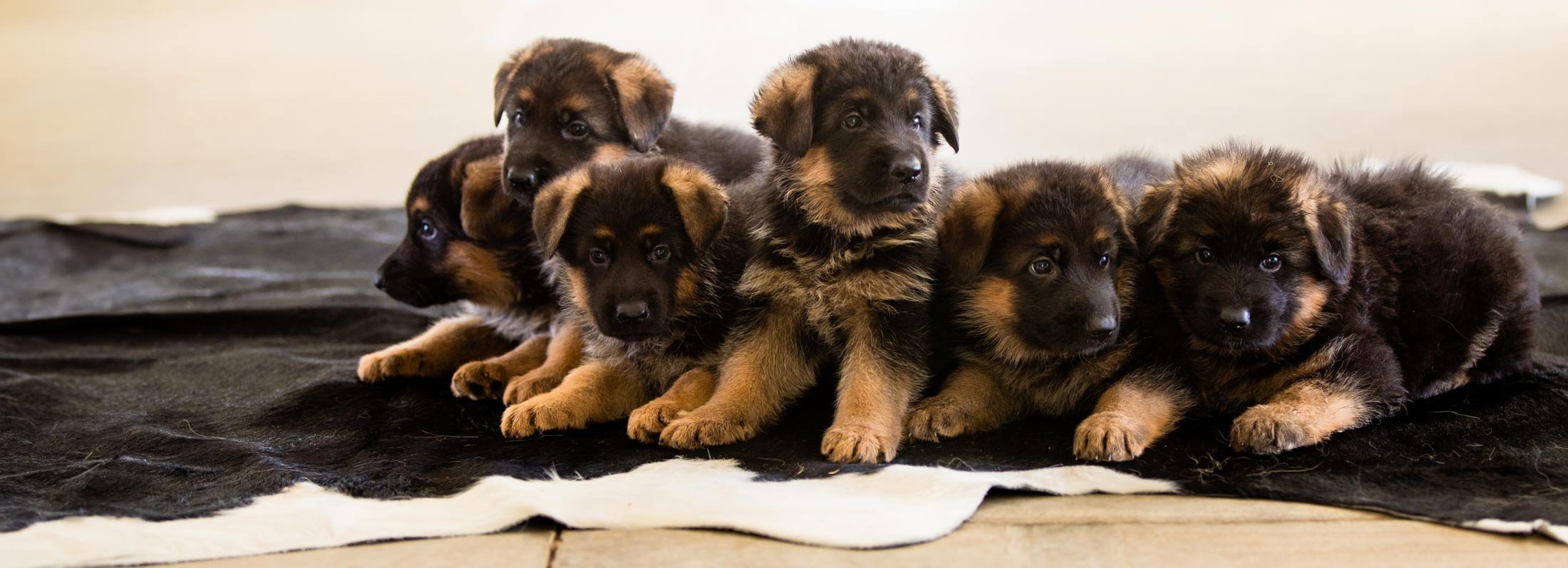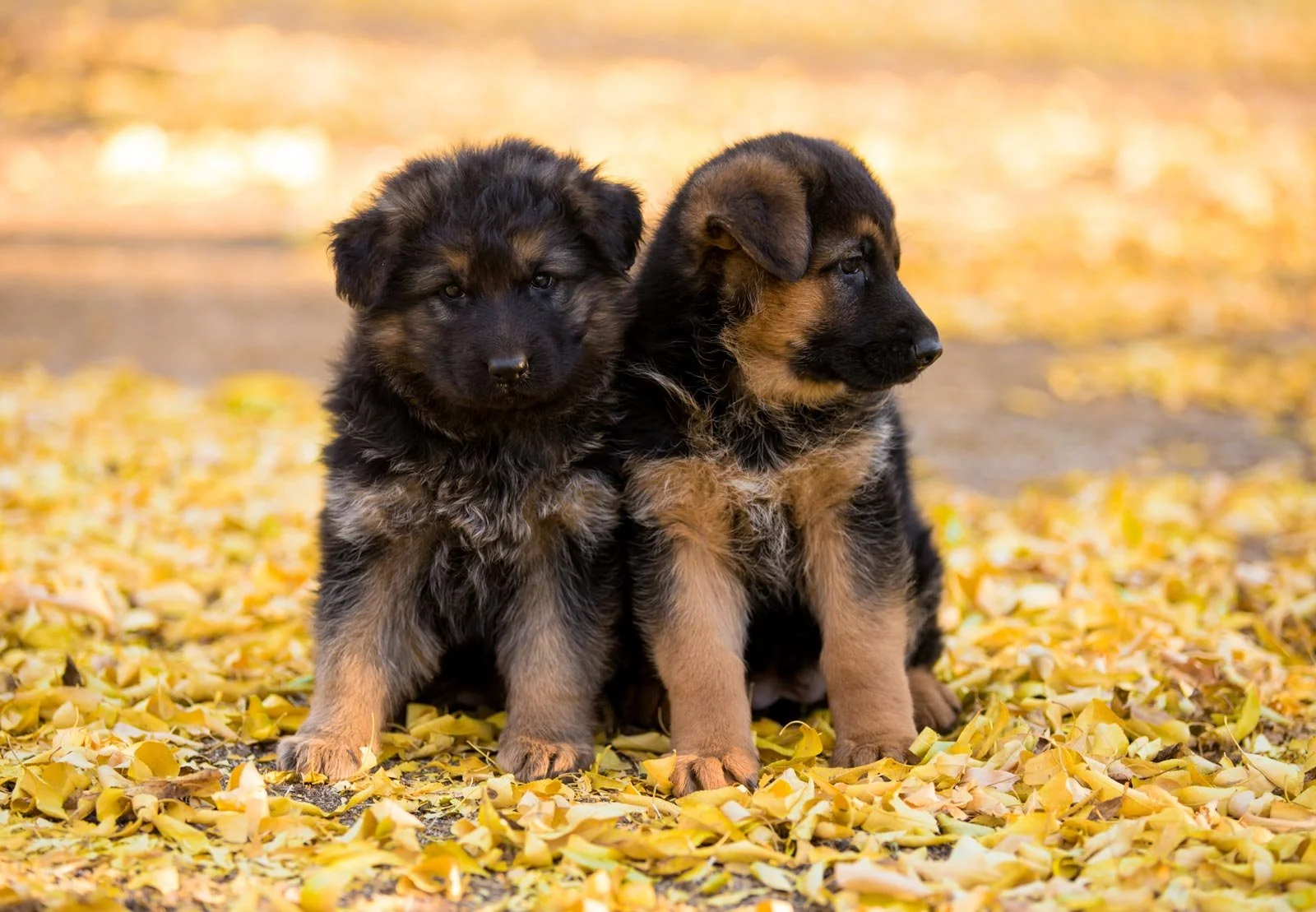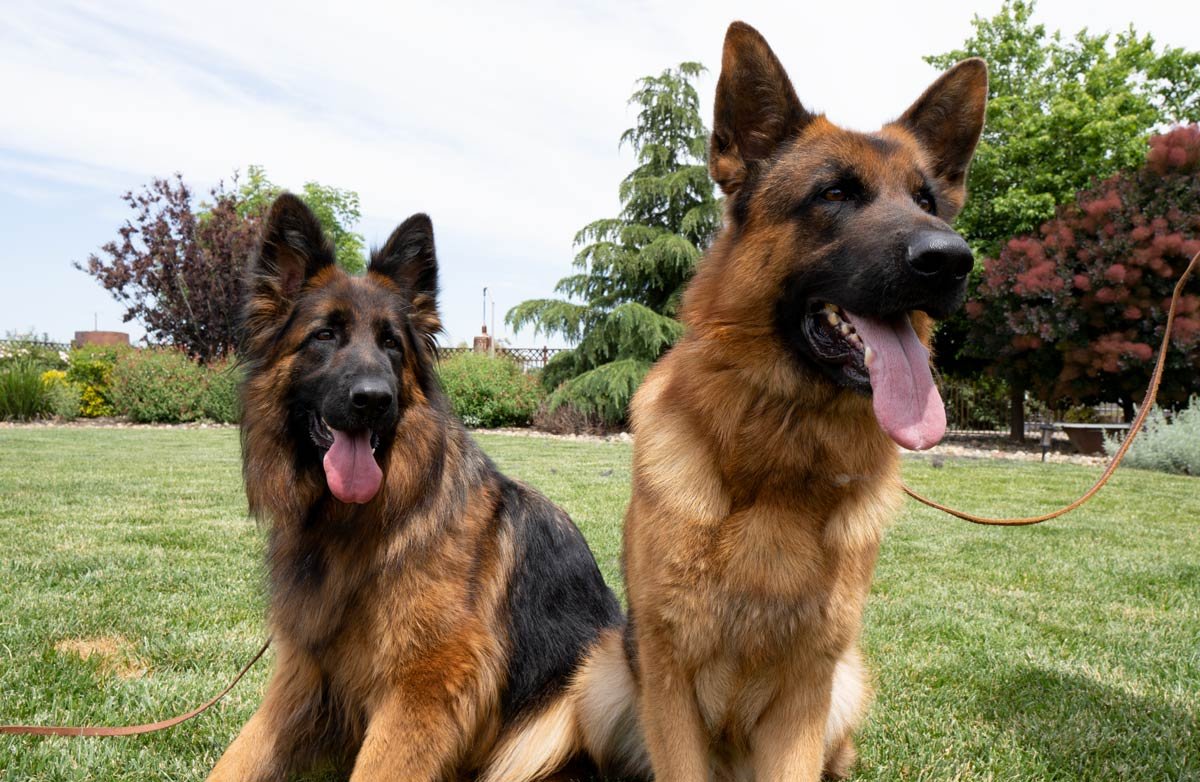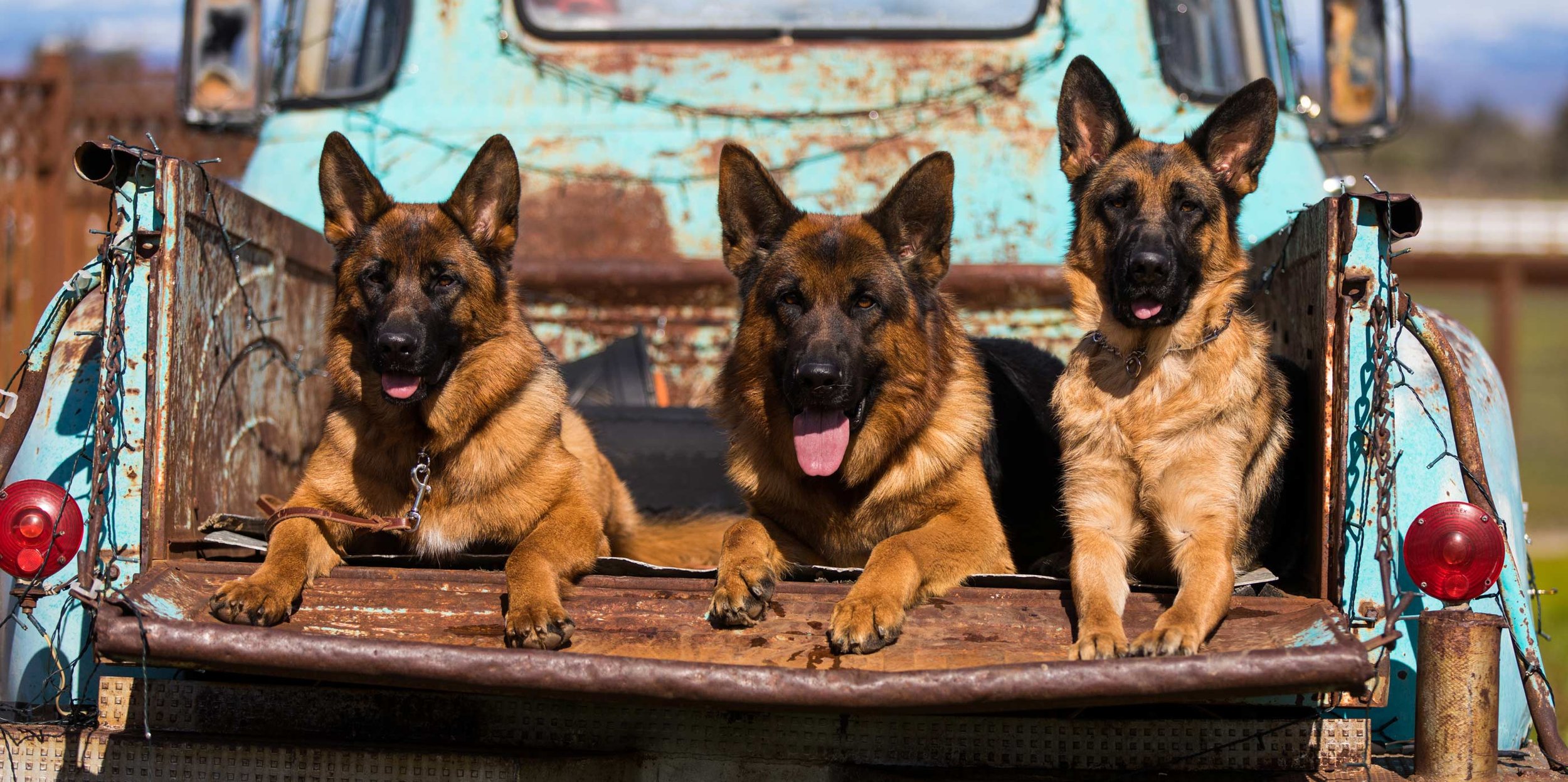
german shepherd puppies: from birth through their first 12 months
By Traci Needles, Found of Nadelhaus German Shepherds
Published: April 20, 2025
What do German Shepherd puppies look like?
German Shepherd puppies change significantly in appearance and size during their first year. From small, black fluffy pups at just a few weeks old to large, athletic dogs by one year, their development is both fast and noticeable. This guide—written by a German Shepherd breeder with nearly 30 years of experience—provides a stage-by-stage look at what German Shepherd puppies typically look like and how they develop at 4 weeks, 8 weeks, 12 weeks, 16 weeks, and up to 1 year of age.
2 week old german shepherd puppies
WHAT TO EXPECT AT 2 WEEKS OLD
Growth and development
Newborn German Shepherd puppies rely heavily on their mothers for food and warmth. Initially uncoordinated, they start to crawl shortly after birth. They are born with their sense of smell already functioning, even though their eyes and ears are still closed at birth. As their eyes open and they begin to explore, they become more aware of their environment.
These early weeks are crucial for growth and sensory experiences, setting the stage for their journey from helpless newborns to curious, playful puppies.
APPEARANCE
Newborn German Shepherd puppies are born nearly all black in color. Over their first two weeks of age, the color of their fur beings to show faint red or tan markings in their faces and paws.
They typically weight around 1 to 1.5 pounds at birth and their bodies are short and plump.
Their noses may be pink at birth but will darken within days. Their tiny paws will have soft, pink pads. Their claws will be delicate and white, but will harden and darken to black as they age.
EATING HABITS
At 2 weeks old, German Shepherd puppies are entirely dependent on their mother’s milk for nutrition. Their digestive systems are not yet developed enough to handle solid foods. Their mother’s milk provides the essential nutrients, antibodies, and hydration they need to grow and build a strong immune system.
At this age, newborn puppies are typically nursing every 2–3 hours, and their nutritional needs are entirely met by their mother’s milk.
sleep HABITS
At 2 weeks old, German Shepherd puppies sleep for most of the day, up to 16 to 20 hours daily. Sleep is essential for their growth and development, as their bodies and brains are rapidly maturing during this stage.
When awake, they’ll spend time nursing on their mother and making small movements as they begin to strengthen their muscles. As they grow older, their activity will gradually increase, and they’ll start exploring their environment more.
3 week old german shepherd puppies
4 week old german shepherd puppies
what to expect at 4 weeks old
Growth and development
At 4 weeks old, German Shepherd puppies have grown significantly and are starting to be more active. Their personalities are being to show and differences between their brothers or sisters will become more evident. You’ll at least be able to notice the most confident pup or the most curious one at this age.
Their teeth are beginning to emerge so they are starting to mouth or nibble on their mom or frankly anything they can get their mouths on. They are starting to walk, though their movements are wobbly. They’ll start to explore their environment, but still rely heavily on their mother at this point.
They’re showing curiosity and will being to play with their littermates, engaging and pawing at them and barking. Puppies at this age will receive their first deworming treatment.
APPEARANCE
Four week old German Shepherd puppies are are still small, but their bodies are longer and they’ve gained more muscle tone. Their faces are now starting to look more like a typical German Shepherd and their muzzles have lengthened.
The fur on a 4 week old German Shepherd puppy is starting to get thicker and softer. Their color patterns are becoming more distinct, with the tan markings being more pronounced and the typical black saddle pattern is now beginning to appear.
Their eyes are fully open and are a deep blue or grayish color, which will turn to brown as they age. Their ears are still floppy, but may perk up or show slight movement if something catches the puppy’s interest. They weigh around 2-3 pounds at this age.
EATING HABITS
At 4 weeks old, German Shepherd puppies are in the weaning phase, transitioning from their mother’s milk to soft, solid foods.
They will still be nursing on their mother, but will do so less frequently as solid foods are being introduced into their diet. Their mother will start to spend more time away from them, will spend less time nursing, and will give harder corrections when her pups are doing something they shouldn’t be doing.
Four week old German Shepherd puppies typically eat 4-5 small meals a day as their stomachs are smaller and more frequent meals will help with their digestion. This age is where we at Nadelhaus kennels will start to introduce raw food to our puppies.
SOCIALIZATION
Socialization with human touch is very important at this age. During this time we expose our 4 week old puppies to lots of human interaction, lots of touching and hands on them. They love to be handled at this point.
We introduce them to new textures, sounds, and environmental changes to help build confidence.
They’re getting better about not going potty in their sleeping area. We start introducing them to going outside to potty, but we rely heavily on their mom to model this. We don’t interact with them yet at this age for potty training.
VIDEO: 4 WEEK OLD (1 MONTH) GERMAN SHEPHERD PUPPY GROWTH AND DEVELOPMENT MILESTONES
Learn more about what to expect from 4 week old German Shepherd puppies.
5 week old german shepherd puppies
6 WEEK OLD GERMAN SHEPHERD PUPPIES
8 WEEK OLD GERMAN SHEPHERD PUPPIES
what to expect at 8 weeks old
Growth and development
This is an exciting part of a puppy’s stage and development, with big differences from 4 weeks to 8 weeks. And at 8 weeks old, German Shepherd puppies are getting ready to go to their new home.
Socializing becomes very important for a puppy at this age. Make sure you’re implementing lots of positive reinforcement for your puppy during this time to build their confidence, limiting any corrections until the puppy is older.
They have been vet checked by now, have started to receive vaccinations and have been dewormed for the second time.
APPEARANCE
German Shepherd puppies at this age are doubling in size every two weeks. Their baby teeth are in and they will be mouthy and will be chewing and biting all the time. Ears are generally still down at this age.
They’re active, they’re energetic, they’re coordinated, they’re running and jumping, and they’re playing much more confidently than they were at 4 weeks. They are now barking and being rowdy, as a typical 8 week old puppy should be. They will typically weigh between 8-10 pounds.
EATING & SLEEPING HABITS
Puppies at this age will be eating 3 meals a day. At Nadelhaus, we feed raw food to all our puppies and we still allow them to nurse on their mothers at this age if they would like. They are sleeping 16-20 hours a day at this age.
Potty training will be an important aspect of bringing a puppy home at this age. Not only will they need to be let outside to potty frequently during they day, they will also need be let out to potty 1-2 times during the night because they are not developed enough to hold their bladders throughout the night. When taking them out at night, we recommend picking them up and taking them directly to their outside potty spot. Don’t interact in an excited way as nighttime potty time is not playtime.
OBEDIENCE TRAINING
Training at this age is just showing what a sit looks like or what a come command looks like, and starting to introduce them to a leash.
Potty training is in progress. You are always working with your puppy by taking them to the same potty place and saying the same thing—reinforcing the location and making it a positive environment.
Crate training is also an important structure for a puppy, so start introducing and getting your puppy used to a crate at this age. Their crate at this age should be small enough for them to lay down, turn around, or stand up, but not big enough for them to be able to potty on one end and sleep on the other.
VIDEO: 8 WEEK OLD (2 MONTHS) GERMAN SHEPHERD PUPPY GROWTH AND DEVELOPMENT MILESTONES
Learn all about what to expect from 8 week old German Shepherd puppies from Traci Needles, dog breeder and founder of Nadelhaus German Shepherds.
Nadelhaus German Shepherds has been breeding world class German Shepherds for nearly 30 years. We have puppy litters available year round and we also imports puppies and dogs direct from Europe.
10 WEEK OLD GERMAN SHEPHERD PUPPIES
12 WEEK OLD GERMAN SHEPHERD PUPPIES
what to expect at 12 weeks old
GROWTH & DEVELOPMENT
A 12 weeks old, German Shepherd puppies are high energy and need plenty of mental and physical stimulation during this time, especially to avoid bad habits from forming.
Socialization is still very important at this age, as the puppy may be going through a fear stage. Exposing your puppy to healthy, positive experiences is important for its upbringing as a confident and well-mannered family member.
At 12 weeks, they’ll need a second set of vaccinations. Your puppy at this age may not have received it’s final parvovirus booster so until your puppy is fully vaccinated, be careful exposing your puppy to strange dogs and avoid taking it to parks or places where it could be exposed to dog feces.
APPEARANCE
At this age, German Shepherd puppies are growing rapidly. Their big feet and longer legs now make them look more put together. They are more agile, balanced and coordinated and are showing increasing curiosity about new environments.
You will begin to see one or both ears starting to stand up, but is common and expected to see their ears go up and down during teething. Don’t worry if your puppy’s ears aren’t fully up yet, or if they go up and then flop back down a few days later. You may not see their ears fully stand up for another 1-2 months.
EATING & SLEEPING HABITS
The appetites of 12 week old puppies are increasing and feeding should typically still happen 3 times a day.
They’re still sleeping anywhere from 14-18 hours a day, including naps. They can sleep 6-8 hours through the night, but still be prepared that they may need a potty break if crated any longer than that, especially if you do not cut off access to water throughout the night.
They’re teething is intensifying and their play biting can be difficult to handle because of their dagger-like baby teeth. Redirect this biting with toys or Benebones.
OBEDIENCE TRAINING
You may need to start working on bite inhibition at this age so the mouthiness and the biting doesn’t get stronger and worse. Due to inexperience or unfamiliarity with the breed, many new German Shepherd owners may assume that their dog will grow out of nipping as it gets older, but this is not correct. Redirecting with toys and play is still the best strategy at this age. Work with your breeder or a professional dog trainer to learn bite inhibition techniques or how to give an appropriate correction for your puppy’s age as needed.
It’s likely you are still working on potty training at this age. The occasional accident will still happen and avoid any kind of corrections if this does occur.
Your puppy can also be introduced to early stages of obedience training. Continue crate training to help establish a route and to help your puppy see its crate as a safe and quiet place to rest.
VIDEO: 12 WEEK OLD (3 MONTHS) GERMAN SHEPHERD PUPPY GROWTH AND DEVELOPMENT MILESTONES
Learn more on what to expect from 3 month old German Shepherd puppies, from energy levels, trainability, sleep patterns, eating habits, and bite redirection.
14 to 16 WEEK OLD GERMAN SHEPHERD PUPPIES
Growth and development
At 16 weeks old—or 4 months—German Shepherd puppies are beginning to look and act more like young adolescent dogs than like small puppies. Their energy levels are high, and they need structured daily routines that include both mental and physical activities to stay engaged and well-behaved. Without proper outlets, boredom in a German Shepherd puppy can quickly lead to destructive behavior or barking.
By 16 weeks, most puppies have received their final round of core vaccinations, including the last parvovirus booster. This typically means it’s safe to start taking your puppy to parks or areas where other dogs frequent. Just be sure to confirm with your veterinarian that your puppy is fully protected before doing so.
This is the most critical stage in puppy socialization, so continue to expose your puppy to new environments, people, and other dogs (that are vaccinated and known to you).
APPEARANCE
At 16 weeks, German Shepherd puppies are growing fast and looking much more proportionate than they did just a few weeks ago. Their legs have caught up with their bodies, and while they may still seem a little lanky, they are becoming more agile and coordinated by the day.
Many puppies will now have both ears fully standing, although it's still normal for ears to still be going up and down during this time. Their adult coat is starting to come in more noticeably, especially around the neck, chest, and back, and their markings are becoming more defined.
EATING & SLEEPING HABITS
At 4 months we’ve now transitioned meals to two a day. At Nadelhaus we like to give a treat or a meaty raw bone in the middle of the day. Always supervise your puppy or dog with raw bones. Monitor their weight and growth, they may need a little more food during growth spurts, but we like to keep our puppies shape looking lean.
They’re still heavily teething and chewing, continue to work on redirection and bite inhibition. Have chew toys handy that can help alleviate their frustration.
They are sleeping 14-18 hours a day, including naps. Try to maintain a routine as much as possible, including feeding times, nap times, and bedtime time at night.
OBEDIENCE TRAINING
At this age we are fully into obedience training and are we are using a prong collar in those training sessions. We are teaching sit, down, come, stay, and place commands to our 4 month old puppies. All with positive reinforcements and corrections when necessary. Of course with a puppy there’s less correction, but prong collars can help introduce more structure into their training. Read our guide on prong collar use for German Shepherd dogs and puppies.
Potty accidents in the house should be very few and far between. We’re still solidly crate training and they should be comfortable to be alone for short periods at a time in their crate and they should be sleeping throughout the night in their crate.
VIDEO: 16 week OLD (4 months) GERMAN SHEPHERD PUPPY GROWTH & DEVELOPMENT MILESTONES
Learn more about 4 month old (16 weeks) German Shepherds and what to expect with their growth, eating habits, behaviors, sleep habits, ears starting to stand, and more.
20 WEEK OLD GERMAN SHEPHERD PUPPIES
what to expect at 20 weeks old
6 month OLD (24 WEEKS) GERMAN SHEPHERD PUPPIES
what to expect at 6 months old
Growth and development
At 6 months old, German Shepherd puppies are officially in their adolescent stage. This is also when many owners start to feel the “teenage” phase kick in.
Your once cooperative puppy may begin testing boundaries, showing signs of independence (or bossiness), and may ignore commands altogether. This is normal, but consistency is key: continue providing structure, sticking to household rules, and keeping daily routines to help guide them through this developmental period.
Your German Shepherd may start to become more watchful and alert, which is typical of the breed. They may begin to bark at unfamiliar sights or sounds. This is normal, but it is important to teach your pup when barking is acceptable to you and when it is not.
APPEARANCE
Six month old German Shepherds are growing ever larger, with males often weighing between 45–60 pounds (a bit less for females) and their bodies are starting to look more defined and muscular. Your 6 month old puppy’s ears should be up by now and if they’re not, reach out to your breeder for help.
They are full of energy and they need lots of exercise and mental stimulation, at least 1-2 hours a day.
Their adult coat is now likely filling in and you might notice their color pattern becoming more defined.
EATING & SLEEPING HABITS
Teething should be ending at soon, but their mouthiness may be continuing if you’ve let this become a habit. Start using obedience training to help stop the puppy from play biting on you.
Meals are still twice a day for a 6 month old. Their appetites may fluctuate during hormonal changes. Keep an eye on rapid growth, they may need a little extra food during growth spurts.
While they may look more like adult German Shepherds, they’re still growing so expect them to be sleeping 14-18 hours a day.
OBEDIENCE TRAINING
Training should be a daily focus at this age and your German Shepherd should know the basics at this point: sit, down, stay, place, come (recall), and heel. Start to introduce distractions—such as having a friendly pet nearby—while continuing to work daily on these commands. If you need help, especially with any reactive or aggressive behaviors, don’t delay in connecting with a professional dog trainer.
Separation anxiety can be a newer struggle around this time, but don’t allow it, instead train and teach them that you are coming back. Crate training is a key to helping reduce destructiveness in a puppy while teaching obedience and confidence in your pup.
VIDEO: 6 MONTH OLD GERMAN SHEPHERD PUPPY GROWTH & DEVELOPMENT MILESTONES
Learn more about 6 month old German Shepherds and what to expect as they transition from puppies to adults.
9 month OLD GERMAN SHEPHERD PUPPIES
what to expect at 9 months old
Growth and development
Nine months for a German Shepherd puppy is the peak of adolescence or the “teenage years”. They’ll have increased strength and endurance at this age.
This is a period where hormonal changes are active, and you may notice your dog becoming more independent, stubborn, or even a little defiant. It’s not unusual for puppies at this age to "test" their owners, ignoring commands they know, or pushing boundaries they previously obeyed. Don’t panic—this is normal adolescent behavior, and maintaining consistent training and boundaries is critical through this age.
We don’t encourage spaying or neutering for our dogs until around two years of age.
APPEARANCE
Your German Shepherd’s ears should be fully up and teething has finished. They should be nearly 70-75% of their full weight and size, with males typically weighing 65-75+ pounds and females a bit smaller. They’re taller, more muscular and starting to filling out.
Their growth plates are still open, so avoid excess jumping or high impact activities. Be careful of running or jogging with them at this age, but you will be able to run with them in another month or two.
They’re still very high energy and make sure you are still getting them plenty of physical exercise (1-2 hours a day combined with walks and training) and mental stimulation (i.e., puzzle toys, scent work, lick mats, etc.). If your 9 month old German Shepherd is chewing, digging, or exhibiting destructive behaviors, you’re not giving them enough physical or mental stimulation.
EATING & SLEEPING HABITS
Two meals a day is still okay for a 9 month old German Shepherd puppy.
Monitor their weight and make sure they have good chew toys for their dental health and to help with any puppy frustration. We never give our dogs rawhides or bully sticks from pet food stores. We only give Benebones or real raw cow femur or knuckle bones for chewing.
They are sleeping 12-14 hours a day, including nighttime sleep and naps. They should be sleeping through the night (8-10 hours) and not needing to get up to go to the bathroom.
OBEDIENCE training
Basic obedience should be very solid at this point, but you may see some regression in obedience due to their teenage phase. This could look like selective listening, leash pulling, barking, or even new behaviors like jumping or guarding.
Continue to reinforce obedience with consistent and short training sessions. Try practicing in different environments with new distractions. Also work on impulse control and train the “off” or “leave it” command if you haven’t done so already. Practice lots of recalls with distractions.
Don’t forget that German Shepherds are working dogs—originally bred in the late 1800s to help herd livestock—so they thrive when they have a job or structure activity.
VIDEO: 9 MONTH OLD GERMAN SHEPHERD PUPPY GROWTH & DEVELOPMENT MILESTONES
Learn about development in 9 month old German Shepherd dogs, who are more akin to teenagers in this stage of their lives.
1 year OLD GERMAN SHEPHERD dogs
introducing the nadelhaus learning center.
Join and learn directly from Nadelhaus founder Traci Needles, who has over 25 years of experience breeding and training German Shepherds.
Over 80 videos on the following topics covering German Shepherd puppies, housebreaking, crate training, obedience, feeding, grooming, wellness, and much more. New videos to be added every month.
LEARN ALL ABOUT GERMAN SHEPHERD PUPPIES AND DOGS
ABOUT THE AUTHOR
Traci Needles is the founder and owner of Nadelhaus German Shepherds™. Traci has been breeding German Shepherds since 1996. With nearly 30 years of experience with German Shepherds, she has extensive knowledge about this incredible working dog breed. Her mission is to breed German Shepherd dogs that have the ability to obtain Schutzhund titles and the highest possible conformation ratings. The German Shepherds she breeds are from 100% German bloodlines and Nadelhaus is a member of the GSDCA-WDA and SV of Germany.

































